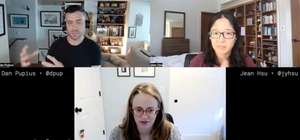In this episode of Lead Time Chats, Jean Hsu, VP of Engineering at Range, chats with Andy Detskas, former Senior Product Design Manager at Strava, about building an inclusive meeting culture.
Andy and Jean discuss:
- Bringing an experience design mindset to meeting design
- How to build an inclusive culture on a hybrid team
- How to mitigate the risk of remote employees feeling like second-class citizens
- Taking into different cognitive approaches when planning for meetings
- How inclusive teams and meetings lead the way to inclusive design and products
Additional Resources
Try running your meetings in Range to easily facilitate more inclusive and engaging meetings. You can get started quickly with meeting templates for your next all-hands, project kick-off, or retro.
Takeaways from Andy
Get to know your reports on a personal level
"One thing that I've employed with my reports is setting aside time with them remote or in person that is not about work. We'll talk about random stuff in our lives, what we're up to. I had a fellow who was remodeling his bathroom and we would get together and talk about that. We also would do a monthly meeting where it was quote unquote anticapitalist time, where we would just get together and talk. We'd walk each other through each other's houses or show someone's backyard and what they're working on in their garden and stuff like that. So that kind of stuff helps to create first and foremost a trusting environment where we get to know each other on the human level. And I feel like that transcends the technology mediating those encounters, so you can go from that to something in person, or you can do that in person and go to remote, and it works in both places in my experience."
Take other people’s cognitive styles into account
“As a facilitator of meetings, one has to be careful about the bias of their own cognitive style and create space for other cognitive styles to exist. And sometimes that means lengthening a meeting from the default 50 minutes or the default 25 minutes to 90 minutes or a couple hours to provide those spaces for different cognitive styles to play and come to an understanding of the work. It also tends to create more space just to think and breathe and not have this harried approach to meetings that you just feel like you're constantly hustling and rushing.”
Design meetings based on who's attending
“If people feel seen and if you're taking feedback, as you do these types of meetings and adjusting your style, I think that can help. It's not just about, I come up with a meeting and after 90 minutes it's done, and I never think about it before. There's a whole kind of lead into it and. Prepping people. And then there's what happens afterwards to honor the time they had spent there, whether it's synthesizing what we've talked about or having a to be continued in another meeting. It's really showing that you're designing for the folks who are going to the meetings, and that to me is the essence of experience design. It doesn't matter if it's not a product. People are coming into a space and experiencing something with you, so the more intentionality you can put around that, the better. It addresses their humanity and helps them feel supported and heard.”
Enjoy Lead Time Chats?
Subscribe to the Lead Time Chats podcast on Apple, Spotify, or wherever you listen to podcasts, so you don’t miss any episodes.
Please leave us a rating or review on iTunes! It'll help these chats get in front of more engineers and leaders like yourself.
About Lead Time Chats
Listen in on unscripted conversations between Jean Hsu, VP of Engineering at Range and other leaders in tech to help you make remote teamwork a little bit less challenging.
Lead Time Chats is brought to you by Range. Range helps remote teams work better together — with asynchronous check-ins, integrated team-building, fewer and more effective meetings, and easy goal-tracking. When you run your team with Range, you’ll always know what’s going on — without having to be in back-to-back meetings.
Checking-in with Range creates more focus time for heads-down work, all while feeling a deeper sense of connection and belonging with your team.
To learn more about Range, you can check it out here.
Season 4 Episodes
» Episode 1: Najeeb Khan on Fostering Belonging on Remote Teams
» Episode 2: Hong Quan on Hiring for Remote Teams
» Episode 3: Jori Lallo on Working Effectively Across Timezones
» Episode 4: Suzan Bond on Navigating Conflict on Remote Teams
Season 3 Episodes
» Episode 1: Jen Kim on how startups can hire better
» Episode 2: Kate Heddleston on managing burnout on your team
» Episode 3: Jessie Duan on the Chief of Staff to CTO role
» Episode 4: Dan Na on pushing through friction
» Episode 5: Pat Kua on flavors of tech leadership
» Episode 6: Anna Sulkina on Endurance Sports and Software Engineering
Season 2 Episodes
» Episode 1: Camille Fournier on making boring plans
» Episode 2: Tess Rinearson on early career engineering managers
» Episode 3: Kim Scott on building for systemic justice
» Episode 4: Sumeet Arora on moving on from a big company
» Episode 5: Rachael Stedman on IC manager work
» Episode 6: Chris Bee on Behaviors of Effective Eng Leaders
» Episode 7: Lynne Tye on the Engineering Hiring Landscape
» Episode 8: Beau Lebens on Distributed Team Meetups
» Episode 9: Indrajit Khare on Getting Acquired by Google
» Episode 10: Jack Danger on Technical Debt
» Episode 11: Sarah Milstein on Successful Remote and Hybrid Teams
Season 1 Episodes
» Episode 1: Will Larson on the path of the senior engineer
» Episode 2: Duretti Hirpa on mentoring junior and mid-level engineers
» Episode 3: Cate Huston on working with an external coach
» Episode 4: Juan Pablo Buriticá on common eng manager mistakes
» Episode 5: Gergely Orosz on the decision to go into management
» Episode 6: Lara Hogan on leading effectively in a pandemic
» Episode 7: Kaya Thomas on common early career engineer challenges
» Episode 8: Uma Chingunde on starting a VPE role in a pandemic
» Episode 9: Katie Wilde on supporting your team's mental health
» Episode 10: Akhil Gupta on navigating uncertainty in new roles
» Episode 11: Harper Reed on giving everyone a voice in team meetings
» Episode 12: Marc Hedlund on sponsorship








